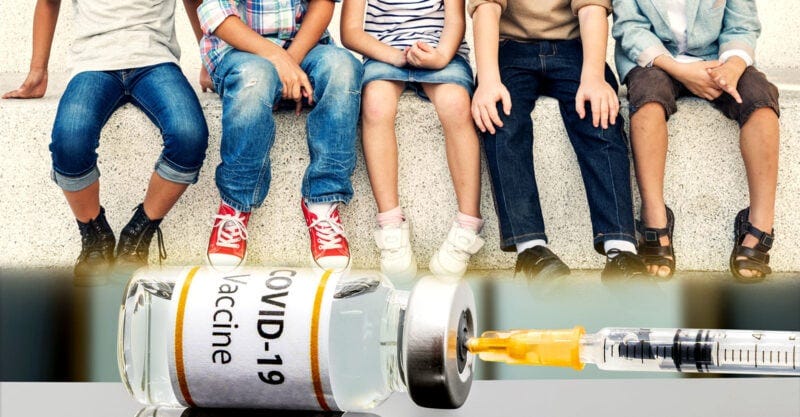Kids, Teens Who Got COVID Vaccine Had 23% Higher Risk of Autoimmune Disease
A growing number of peer-reviewed studies are linking the COVID shots to long-term risks.
This article originally appeared on The Defender and was republished with permission.
Guest post by Michael Nevradakis, Ph.D.
The Israeli authors of a peer-reviewed study published this month in Pediatric Rheumatology said their findings warrant further research to understand the long-term effects of COVID-19 vaccines in children.
Children and adolescents who received at least one COVID-19 vaccine had a 23% higher risk of developing autoimmune disease compared to unvaccinated children, according to the findings of a peer-reviewed study published last week in Pediatric Rheumatology.
Growing “concerns about the emergence of new autoimmune diseases” prompted the study, according to the four Israeli researchers who authored the paper.
Using the health records of 493,705 Israeli patients up to age 21, the authors studied the incidence of autoimmune diseases, which occur when the immune system attacks the body instead of defending it, in vaccinated and unvaccinated subjects before and during the COVID-19 pandemic.
The study measured a hazard ratio of 1.2323 for patients who received at least one dose of a COVID-19 vaccine. This translates to a 23.2% greater risk of developing an autoimmune disease when controlling for age, sex and socioeconomic status — a statistically significant outcome, according to the study.
By comparison, unvaccinated children with a prior COVID-19 infection did not have a statistically significant increase in risk for developing autoimmune disease.
Autoimmune diseases cover a range of conditions, including Type 1 diabetes, rheumatoid arthritis, psoriasis, celiac disease and rare neurological disorders like Guillain-Barré syndrome — which has been associated with COVID-19 vaccines.
In a post on Substack, epidemiologist Nicolas Hulscher said the study’s findings “underscore the clear long-term dangers of COVID-19 vaccination.”
Karl Jablonowski, Ph.D., senior research scientist for Children’s Health Defense, told The Defender:
“The immune system is an extremely complex system, our knowledge of which is hardly scratching its surface. Any time we meddle with it … we risk unintended consequences.”
According to pediatrician Dr. Michelle Perro, the study was methodologically robust. “Larger sample sizes increase the ability to detect true effects and reduce the margin of error, strengthening the reliability of the study’s findings,” she said.
“A strong feature of this paper is that they looked at children from 1 to 21 years. Although that age range extends beyond what we generally use — 1 to 18 years — younger adults are particularly prone to autoimmune disorders since they can take time to develop,” Perro said.
The authors of the study concluded that their findings warrant “further research to elucidate long-term effects in the pediatric population.”
Autoimmune diseases have ‘serious health ramifications’ for children, teens
The study also found that the period between COVID-19 vaccination and the onset of autoimmune disease averaged 8.74 months. Perro called this a “major finding,” indicating the need for long-term clinical testing of vaccines before they’re approved.
“The takeaway is that prior to the introduction of any proposed pharmaceutical for children, there must be an adequate time period of study,” Perro said. “The development of vaccines for children typically spans 10 to 15 years, including preclinical research, three phases of clinical trials and regulatory review.”
Regulators didn’t follow that timeline for COVID-19 vaccines, as clinical trials were rushed as part of “Operation Warp Speed.”
“Children were not adequately studied prior to the roll-out and have paid the consequences,” Perro said. She said autoimmune diseases are difficult to treat even from a holistic perspective and have “serious health ramifications.”
“We don’t even understand the mechanisms that lead a vaccine to induce autoimmunity,” Jablonowski said. “Diseases of autoimmunity are among those we have the least success in treating.”
Growing number of studies links COVID shots to autoimmune conditions
Some experts warned of a potential “super-epidemic” of autoimmune diseases just weeks after the COVID-19 vaccines were released to the public. Meanwhile, several recent studies have linked autoimmune disorders to the COVID-19 shots.
A study by 19 German scientists published in Molecular Systems Biology in March linked the mRNA COVID-19 vaccines to long-term changes in genetic structures that can provoke an inflammatory response, and lead to the onset of cancer and autoimmune disorders.
A study published last month in Immunity, Inflammation and Disease found that people who received the COVID-19 vaccine exhibited elevated levels of multiple proinflammatory cytokines — proteins that help regulate the immune system. These cytokines are associated with conditions including chronic inflammation, immune dysregulation and autoimmune activation.
A preprint by a group of scientists led by three Yale University researchers and published in February found that those who received the COVID-19 vaccine were at increased risk of autoimmune disorders, immune system exhaustion and other biological changes following vaccination.
And a meta-analysis conducted by researchers at Saint Peter’s University Hospital in New Brunswick, New Jersey, last year found that COVID-19 vaccines may increase the risk of thyroid-related autoimmune diseases, particularly in women.
Several of these studies highlighted the spike protein in the mRNA COVID-19 vaccines as a potential contributor to the higher risk of autoimmune disease.
For instance, according to the Immunity, Inflammation and Disease study, “the persistent production of spike protein” may help account for elevated cytokine levels.
Young adults in the study showed elevated spike protein production a year or more after vaccination, significantly longer than the spike protein was expected to remain in the body.
“The mechanisms of the induction of autoimmunity may be related to the spike protein,” Perro said. One such potential mechanism is molecular mimicry, where viral proteins share structural similarities with human proteins, leading the immune system to attack the body’s tissues.
Another possible mechanism is bystander activation, “where the immune system responds to the spike protein and inadvertently activates nearly all immune cells that target self-antigens,” Perro said. This process can lead to tissue damage.
According to Perro, the body’s initial encounter may also “increase the immune system’s attack on the body’s own proteins,” in a process known as epitope spreading.
New autoimmune disease diagnoses ‘skyrocketed in our practice’
Dr. Margaret Christensen, a trained gynecologist, clinical educator and co-founder of the Carpathia Collaborative, said the new study’s findings match trends she’s observed with patients at her practice.
“Since the advent of the COVID-19 vaccine, the number of young women and men with newly diagnosed autoimmune diseases has skyrocketed in our practice,” Christensen said.
Perro said the new study strengthens calls by a growing number of scientists and medical professionals for the suspension or withdrawal of mRNA vaccines.
“This study undoubtedly confirms the urgency on the part of the U.S. Department of Health and Human Services [HHS] to demand that the U.S. Food and Drug Administration immediately cease all COVID-19 vaccinations, as well as mRNA technology in children and pregnant women,” Perro said.
Last week, The Wall Street Journal reported that HHS plans to stop recommending COVID-19 vaccines for pregnant women, children and teens.
Related articles in The Defender
HHS Will Stop Recommending COVID Vaccines for Kids, Teens and Pregnant Women, WSJ Reports
mRNA Vaccines Linked to Genetic Changes That Can Cause Cancer, Autoimmune Disorders
Young Adults Continue to Produce Spike Protein One Year After Receiving COVID Vaccine
Watch: Spike Protein Leads to ‘Five Mechanisms of Damage’ in Human Body
Are We on the Verge of a ‘Super-Epidemic’ of Autoimmune Diseases?
Donate to Children’s Health Defense


